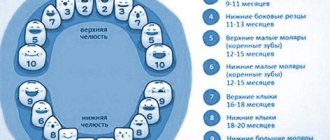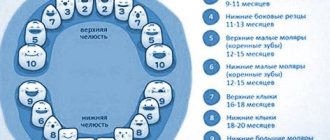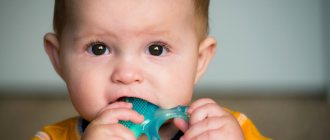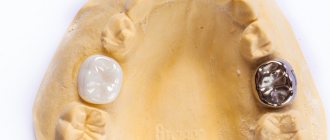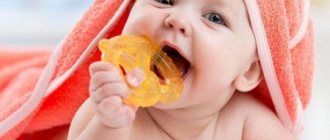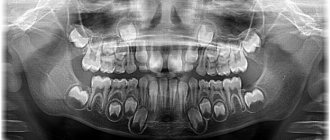Is it normal for babies to have a teething fever?
When teething, your baby may actually develop a fever. When a tooth moves inside the gum, its tissue is injured. The child is in pain and is nervous. And since the baby’s thermoregulation mechanisms are not yet perfect, his temperature can rise even in response to stress. Later, when baby teeth are replaced with permanent teeth, the child may also experience discomfort, but his temperature will remain normal.
However, an increase in temperature during teething may also indicate that the child is simply sick. When a baby is teething, his body experiences additional stress, so his immunity is weakened. Sometimes parents attribute a high fever to “teeth,” but at this time it is necessary to treat the viral infection.
Temperature on teeth.
How long can it last? That's the whole question...
My son woke up on Tuesday morning, somewhat calm, sat him down for breakfast - he didn’t eat, I touched him - he seemed hot, they took his temperature - 38, lay there for an hour - and measured all 39. I called the doctor. The pediatrician came, no cough, no snot, fever and that’s it. I saw 4 chewing teeth at once and said they were all cutting together at once and would come out by Friday. And the neck is a little red. She prescribed us Augmentin (an antibiotic) - to prevent laryngitis against the background of teeth, along with Linex for possible diarrhea from taking an antibiotic, Protorgol to prevent a runny nose from starting, Fenistil for a possible allergy to medications, spray Miramistin on the gums (why?), and Viburkol suppositories and smear Baby Doctor on your gums - this is directly from the teeth. I asked - what if the temperature persists? She says that everything will go away with an antibiotic.
But in the end we decided not to give the antibiotic; Linex is not needed in this case. I still don’t have a runny nose, thank God, I don’t need Fenistil either, I don’t understand why Miramistin, and my son won’t even let us look at his mouth in any case, let alone do anything there. In the end, I was left with Viburkol suppositories, but somehow without any effect (and I don’t really believe in homeopathy, to be honest, it never helps me). The temperature yesterday and the day before yesterday did not drop below 37.8 even with Tsefekon suppositories and Nurofen mixture, the mother-in-law raises a panic that these are not teeth, we still have no other symptoms of anything (well, maybe only the voice sometimes gets a little hoarse if the child screams for something -demanding). Yesterday, rushing around the apartment with my husband in a panic at night (temperature 39), I put in Cefekon and gave Nurofen almost immediately - the temperature subsided (but I was scolded by a pediatrician friend). The result is that a child with a normal temperature woke up shortly after a night’s sleep (though he fell asleep only at 3 am with a fight, but that’s another epic). Now he’s sitting watching cartoons, his temperature is normal for now.
It’s just that if now the temperature suddenly rises again, I’m probably too late to call the pediatrician today. and what should I tell her? I called you, but did not treat the child as you said. Why did you call then? It’s just a shame... But even for prophylaxis, giving an antibiotic is somehow too much. In general, I’m sitting here reproaching myself, what kind of mother is she... A sick child, and what the hell am I doing...
Dear girls, scold me, calm me down, tell me how you cut your teeth? What was the temperature, for how long, what did the doctors prescribe, how did you cope? So the child is cheerful, even with a fever, plays and runs around the apartment. Just more moody, and sometimes looks sick when he’s tired. He has a great appetite, drinks a lot, and pees a lot too)
Methods for reducing temperature
To reduce fever in young children, you can only use drugs based on paracetomol or ibuprofen in the form of syrups and suppositories. Tablets are not given to children under 3 years of age, as it is difficult to correctly calculate the dosage of the medicine.
When the temperature is high, the child needs to be given water often. Warm water, fruit drinks and compotes without sugar, and children's tea with rose hips are suitable. If the child is breastfeeding, continue breastfeeding as required and supplement between feedings.
The room of a sick child must be regularly ventilated and the air humidity in it must be at least 40%. To do this, you can use humidifiers or at least hang wet towels. The room temperature should not be higher than 18-20 ℃.
Thus:
- Temperature during teething in babies of the first year of life, one year and older is normal if other reasons for its increase are excluded.
- During teething, the temperature lasts an average of 1-3 days.
- Temperatures above 38.5 ℃ should be alarming, since during teething it increases by only half a degree.
- Temperatures above 38.5 ℃ should be brought down. If the child is capricious and does not feel well, then an antipyretic can be given at a lower temperature.
- The temperature of young children is brought down with paracetamol and ibuprofen in the form of syrups and suppositories. The room where the child is located must be regularly ventilated, wet cleaned, and ensure normal humidity and temperature. A sick child should be provided with rest and plenty of warm drinks.
(0 ratings; article rating 0)
Share Share Share
Teething or infectious disease
However, most modern pediatricians agree that such symptoms in an infant as: long-term, over 2-3 days diarrhea, cough, vomiting, fever (increase in body temperature above 38.5 degrees) are most often caused by infection, and not just teething teeth. Therefore, with any of the above symptoms, it is necessary to examine the child by a pediatrician, and only after other causes of increased body temperature have been excluded, efforts should be concentrated on helping the baby to reduce the discomfort from teething.
Ways to lower temperature at home
- Rubdowns can be done at intervals of 2 hours. Wipe your hands, knees, armpits, and groin area with a soft cloth soaked in water at room temperature. It is important to prevent hypothermia!
- Drinking plenty of fluids is recommended to reduce fever. This will relieve intoxication and protect the child from dehydration.
The main thing that parents of a teething child will need most is patience.
If your child has dental problems, the Dentistry Center will come to the rescue. Experienced pediatric dentists work here who will find an approach to any fidget, and in a playful way will treat children’s teeth using the most modern techniques.
Doctors at our clinic work with visitors of all ages.
Teething: how to help your baby
This may require a fair amount of patience. During such a difficult period, you should take the baby in your arms more often, caress him, distract him from unpleasant sensations with toys, turn on pleasant, soothing music, and you can sing if natural abilities allow. A walk in the fresh air can also have a calming effect. Children who are breastfed, during teething, begin to cry more often and ask for the breast, and a loving mother needs to be patient, putting the baby to the breast every time, even if he grabs the nipple areola harder than usual during feeding. To satisfy the child’s need to chew something and hold something in his mouth, you can naturally use special rubber rings or toys, so-called teethers. You can offer your child dry food or baby cookies.
Currently, pharmaceutical companies offer a wide range of different products, primarily in the form of gels to “soothe the gums.” In general, most of these products contain painkillers such as lidocaine. You should not abuse these funds. They are not completely harmless; the anesthetics they contain can have an adverse effect on the child’s nervous and cardiovascular systems, and most importantly, they can cause serious allergic symptoms and contribute to the exacerbation of atopic dermatitis (diathesis) in children prone to allergies. In connection with the above, I can recommend, to reduce swelling and inflammation of the gums during teething, such special dental anti-inflammatory drugs for topical use as Cholisal gel, which can be applied to the baby’s gums 2-3 times a day, but must be rubbed in (not too much). of course) with light massaging movements over the entire surface of the gums, and not just putting it in the child’s mouth.
In addition, you can give a child suffering from teething special homeopathic drops, for example Dantinorm baby, according to the instructions for the drug. In any case, if the disturbing symptoms described above in this article appear, I advise you to play it safe once again and call a pediatrician to the home of a child with a high fever. A professional should give his diagnosis and recommendations.
Temperature at the appearance of the first teeth
The appearance of a baby's first teeth is a very important event that all parents look forward to. But, unfortunately, this process does not bring such joy to the baby himself. Teething is most often accompanied by pain, swelling of the gums, constant itching, as well as possible fever, runny nose and even cough. In rare cases, the appearance of the first teeth is not felt at all by the baby, and the entire process is painless. But, more often than not, long sleepless nights await the baby and parents. Sometimes the baby’s temperature rises to 39 degrees. In such cases, it is necessary to resort to professional medical help, and in no case self-medicate. Let's figure out why a child's temperature rises when his first teeth appear. Before it appears, the tooth cuts through the bone tissue, and then through the gum. All this is accompanied by swelling and itching of the gums, hence the pain. The place where the tooth erupts becomes inflamed, and the child’s immunity decreases. Due to this, the temperature rises. As the baby cuts his first teeth, his salivation also increases. Thus, the body protects itself from possible infection, because saliva has an anti-inflammatory effect. As a rule, the temperature during teething rises to 37 - 37.7 degrees. This temperature should not be brought down; this is a kind of protective reaction of the body. The main thing is to constantly monitor the baby, control the rise in temperature, because there are often cases when the thermometer shows 38 and 39 degrees. It is necessary to measure your temperature every hour, especially in the evening when it can rise sharply. If antipyretics and rubbing do not help, and the mark on the thermometer does not decrease, you should immediately consult a doctor. And if the temperature is above 39 degrees, immediately contact an ambulance. Typically, the rise in temperature during teething lasts 1-3 days. On the 4th day it should decrease. If your baby has a fever for a longer period of time, you should consult a doctor. It is necessary to accurately determine the reason why the temperature does not decrease. Indeed, when it rises to 38-39 degrees, the baby, in addition to the appearance of teeth, develops some kind of infection. The attending physician will be able to diagnose the cause of the disease. It is simply necessary to invite a specialist in such situations, because you cannot risk the health of a small child. Drugs to reduce fever during teething A large number of different antipyretic drugs have now been developed for very young children. Basically, they are presented in the form of candles or syrup. Antipyretic medications most often use paracetamol or ibuprofen. After taking the drug there will be no immediate effect, you need to wait 45-60 minutes, only after this time will it work. It is necessary to choose the right remedy based on the symptoms of the child’s disease and the recommendations of the treating pediatrician. You should not make a diagnosis and select treatment on your own. It is also important to strictly adhere to the instructions for use of the drug for infants and young children, to correctly calculate the dosage based on the age and weight of the baby, as well as the frequency of use of the medicine. Health to you and your kids!
